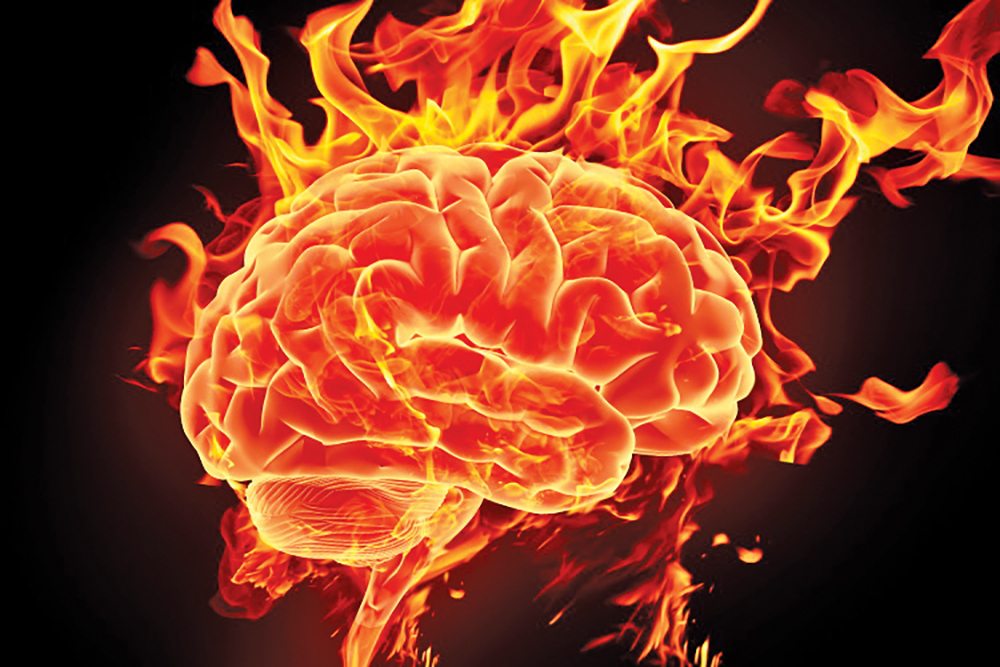
Nearly one in six children between the ages of 2-6 (17.4%) has a diagnosed mental, behavioral or developmental disorder. More than 17 million children in the United States have or have had a diagnosable mental illness. Mental disorders are either primary or secondary. Primary mental illnesses are rather treatable than curable and the treatment is most of the time lifelong. If you ignore that behind the well made diagnosis there may be a deeper reason for the symptoms, you accept the fate of what a primary mental health disorder is about.
The expression “brain on fire” means that the child has only a brain inflammation as opposed to having a true psychiatric disorder, where the psychiatric disorder is only a symptom and not the disease. The causes of neuroinflammation are numerous and often combined with each other. Many extra-psychiatric conditions may cause psychiatric disorders. The most common ones are infections, autoimmune encephalitis, and toxicity including but not limited to mold, heavy metals or pesticides. Metabolic or nutritional factors may also contribute to mental disorders.
Lyme Disease and Neuro-Psychiatric Disorders in Children
Children develop more central nervous system symptoms while adults develop more symptoms from the peripheral nervous system. The most common manifestations of Lyme disease in children are emotional, cognitive and behavioral. The change of personality is definitely the number one symptom of Lyme disease in children. Lyme disease may be responsible, according to psychiatrist Dr. Robert Bransfield, for a wide spectrum of neuropsychiatric symptoms, which may include: developmental disorders, autism spectrum disorders, schizoaffective disorders, bipolar disorder, depression, anxiety disorders (panic disorder, social anxiety disorder, generalized anxiety disorder, OCD), intrusive thoughts, eating disorders, sleep disorders, addiction, cognitive impairment, brain fog, seizure disorders, suicide, violence, social withdrawal, depersonalization, dissociative episodes, derealization, etc. Studies reveal that 20-25% of autistic children in the U.S. have been shown to have Lyme disease. Children may have difficulty with attention and concentration, speed and efficacy of processing information, learning and memory, auditory processing and language expression. Sleep disorder is common or returns to bedwetting or loss of daytime bladder control.
Teenagers may have mood swings, depression, suicidal thoughts, personality changes, sleep problems, poor concentration, cognitive disorder, a loss of interest in school and school activities and interest in family values. Most children who present with cognitive or psychiatric disorders do not remember a tick bite. They are already in the late phase of the disease. The initial phase may be missing. The symptoms and severity of symptoms can vary from day to day. A child may feel well enough to go to school one day, but not the next. A psychiatric disorder may be the only symptom. Dr. Brian Fallon, director of the department of Lyme disease of Columbia University, wrote, “Psychiatrists who work in endemic areas need to include Lyme disease in the differential diagnosis of any atypical psychiatric disorder.”
Basal Ganglia Autoimmune Encephalitis (Pandas/Pans)
Autoimmune encephalitis is characterized by an abrupt onset, often from one day to the next and by the correlation in time between the evidence of an infection and a sudden and acute new onset of a neuropsychiatric disorder. PANDAS refers to encephalitis due to streptococcal infections, whereas PANS to other infections. The diagnostic criteria of PANDAS/PANS are to have an abrupt, dramatic onset or recurrence of OCD, acute onset of anorexia and/or severe restrictive eating disorders with at least two of the following symptoms.
Anxiety, including new onset of separation anxiety or hyper-alertness
Behavioral regression (baby talk, tantrums)
Emotional lability including suicidal depression, hallucination
Irritability, aggression, raging, severe oppositional behaviors
Hypersensitivity to light, noise or touch. The child may not tolerate his/her clothing
Tics, involuntary movements
Handwriting change
Deterioration in school performance and cognitive changes, (difficulty focusing)
Sleep disturbances (difficulty falling asleep, night terrors, refusal to sleep alone)
Urinary frequency or urgency, new onset of bedwetting
Toxicity
Heavy metals (mercury, lead, etc.), mycotoxins released by mold, and other environmental toxicants are neurotoxic and may also be responsible for neuropsychiatric disorders.
Post-COVID
Anxiety and depression may be common six months after COVID-19 recovery.
Nutritional and Metabolic Factors
Glutamate, GABA, histamine, oxalate, copper, zinc, selenium, vitamin Bs in excessive or insufficient amounts, and the inability to process folic acid as seen in those who have MTHFR mutations, have also been associated with mental disorders.
Gut Inflammation
The gut-brain axis (GBA) consists of bidirectional communication between the central and the enteric nervous system, linking emotional and cognitive centers of the brain with peripheral intestinal functions. Gut inflammation can cause cognitive and mental health disorders too.
Conclusion
Wondering whether a mental disorder is either primary or secondary, even when the disorder is well categorized as well-known mental disease, is the only way to give a chance to convert a lifelong, treatable but not curable mental illness into a curable disease to relieve from the social and medical burden of a psychiatric illness.
Alain Mass, M.D. is Board Certified in Family Medicine, member of the International Lyme and Associated Diseases Society (ILADS) Diplomate of the International Society of Environmentally Acquired Illnesses (ISEAI), member of the Pandas Physician Network (PPN)
Contact (845) 623-0047; [email protected]; massfunctionalmd.com.












